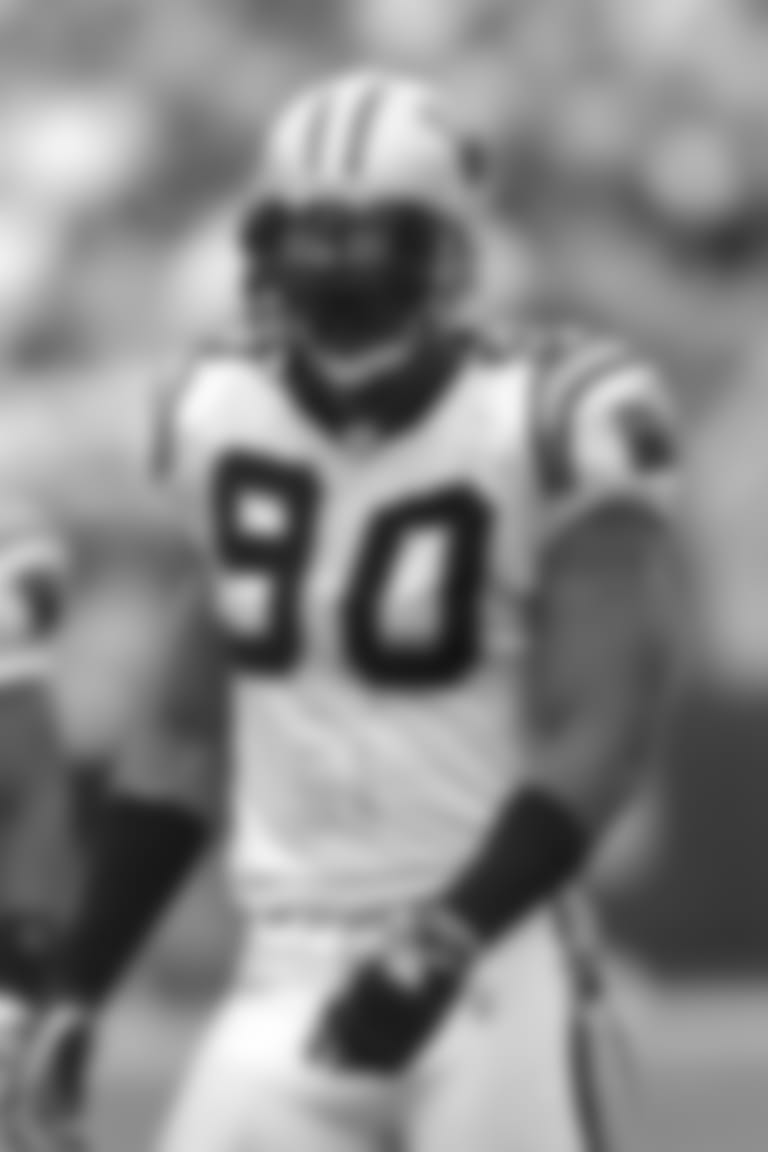CHARLOTTE — Time can play tricks with a memory.
But the things that matter last, even if it takes you a moment to see them, or to realize how much they always mattered. And the things that might not have seemed out of the ordinary become profound when you step back and consider them again.
So for the Carolina Panthers on Jan. 2, 2004 — the privileged few who were there to hear it — they got the first draft of a piece of team history, a moment that no one will ever forget, a moment that became part of something bigger than a football game, even a playoff game.
Sam Mills was already part of the fiber of the Carolina Panthers, long before his words were woven into the fabric they wear each game day.
But before Keep Pounding could become a rallying cry, men had to cry when a man said it for the first time.
A sick man. A strong man, but a very sick man. But a man whose words carried more weight because of who he was and what he meant to all of them.
And even if they didn't know it in the moment, they were words that changed the course of a franchise.

For the small group — fewer than 100 people total — who heard the words in person for the first time that Friday, the memory has done the same thing that Mills has done over time, even in his passing.
From a humble start, they've only gotten more well-known, and bigger, and more powerful. They grew on everyone there that day. And then beyond.
No one necessarily knew what to expect that morning when they went out to the practice fields behind Bank of America Stadium, the day before their home playoff game with Dallas. But as time passed, all who were there were moved by the words — the Cowboys found out the hard way — and a legend was born.
Keep Pounding.
"It was simple, but that was Sam," former Panthers safety Mike Minter said. "The great speeches aren't great moments until later.
"Everybody who left the field that day knew."
And if that moment became legendary immediately, it only grew as the years passed.
"I see it right now," former running backs coach Jim Skipper said. "I can hear it as clear as me and you talking."
Like a lot of legends, there are certain aspects of the story that have become mythical over time. Some swore it happened in the locker room or the team hotel the day before the game.
But it was right out there, on the thinning January grass, the green of spring long since yielded, and there was a chill in the air that cut through, even on a mild winter day (the low that morning was 43 degrees). That was largely because the select few people who were there knew the stakes. Mills had been diagnosed with a particularly aggressive form of intestinal cancer the previous summer, and was given just a few months to live. The fact he'd be there at all in January wasn't a given, so any words he said carried weight.

And other than the fact it was the playoffs, it might have been any other day-before-a-game in a long season because of the comfort that comes with familiarity.
Then-Panthers head coach John Fox had a tradition that year. Each week after the final practice, he'd have one person address the team, to put the punctuation on the preparation.
Some weeks it might be a star like Minter, the hard-hitting safety who was adopted by Mills early on. Some weeks, it might be a special teams captain like Karl Hankton. The point was, it could have been any of them at any moment, and they didn't necessarily know it would be their turn. He wasn't giving guys time to write a speech because he wanted it to be genuine and from the heart.
"Nobody had any clue what was coming," Fox said. "It wasn't planned out; the whole thing was pretty spontaneous. I didn't ask him what he was going to say, and nobody in that group had any idea. It was all Sam.
"To be honest, those speeches were almost routine for us, so the fact it's still a mantra is pretty cool because of how it came to be."

And there are certain elements of the legend that leave room for the imagination because, as unbelievable as it seems in this thoroughly documented time, there was no recording of those famous words.
"When I found out I had cancer, there were two things could do: quit or Keep Pounding," Mills said, in the generally accepted summation of what was said that day. "I'm a fighter. I kept pounding. You're fighters, too. Keep Pounding!"
That's the version that has become official. But it's oral history at best; a story passed by memory from one generation to the next, its theme more important than the particulars. It's not apocryphal; too many people remember too similar a message. But there's no way to know the precise words because they were never captured.

Right guard Kevin Donnalley had carried a handheld video camera around with him all year in 2003, preserving moments big and small. He's got boxes and boxes of old videotapes in storage, the kind of stuff that would make a movie you'd watch. He has everything from celebratory locker rooms after yet another comeback win that season to stupid practical jokes, like guys dumping buckets of ice water over a bathroom stall on an unsuspecting teammate just to hear them yell swear words.
He has the profane, but not the sacred. Mostly, because it was a regular walk-through at the end of a regular work week, and he didn't think something sacred was in store.
"I wish I had," Donnalley said. "But there was no reason to, because we didn't have any idea what was coming."
And while the team had a fully stocked video department, they were just there for the football stuff, so coaches could critique practice later.
"Yeah, any film we had from that day didn't have audio anyway," former video staffer Chris Herbert said. "That's not what we were there for, and as soon as practice was over, we were breaking down and getting out of there so the coaches had film."
Likewise, the few people on the field that day began to scatter as it was almost exclusively players and coaches by that point. Walk-throughs were closed to the media , but even the team's support staff was largely indoors by the time it was said.
"I wasn't there," former PR director Charlie Dayton said. "But I was in the locker room afterward, and you could tell that whatever was said made an impact, because everybody was talking about it. And at that point in the week, guys didn't typically talk about things like that."
Fox paused when he recalled it, because that limited audience seemed to give the words more power.
"I think having it happen out there on the field, with only the guys who were going to be on the field next day, definitely made it more intimate," Fox said. "The only people who heard it were the people Sam wanted to hear it."
The emotion with which Fox described it makes you wish even more there was a tape hidden somewhere, that someone recorded it, if only so people could nail down the details and find even more meaning in it, or just hear that long-silenced voice again.
"Coach Fox was right; I honestly don't remember the specifics," linebacker Dan Morgan said. "I remember him giving a passionate speech and being inspired by it, but the Keep Pounding part of it ... that morphed into a thing later.
"I think that day, it was just the passion, you knew what he was going through, and it was heartfelt what he said to us."

But because of when it happened and who said it, it was burned into their souls. Even the ones who were foggy in the details at first became certain of them because the core of the message was so powerful.
"The more I talk about it, the truth is, it was such a blur," wide receiver Steve Smith said. "I was too busy looking at a man talking to us who was sick but was making it about everyone else but himself. And I was in awe at that. I don't know if I would be able to keep it together to know I have a terminal disease and tell other men to do something and make it about them. When I search my heart and my mind, this dude is talking to us about life and tomorrow, and he doesn't know if he's going to wake up tomorrow. Wow.
"It was from someone you didn't expect it from. You weren't prepared for a speech because you didn't know Sam was giving a speech. So it's like you're a photographer, and you put your camera on the belt at security, and the biggest moment happens when you're in the security line."

Quarterback Jake Delhomme had a similar recollection, saying he wouldn't have been able to dictate the words at the moment, but the message stuck. Mills had been doing that for him all season — one undrafted underdog to another. Delhomme remembered feeling sore and sorry for himself after a late-season loss, only to have Mills run past him out of the locker room and smack him and say, "Let's go get better." The guy with cancer had sprints to run before practice. So the guy with the sore back picked it up a step.
"I was pretty disgusted with myself after that," Delhomme said. "This man's out there dying, and he's going to run 110s before practice, so what the hell's wrong with you?"
In that regard, it was similar to the impact the speech had on Morgan.
He was in positional meetings with Mills every day. They passed each other in the weight room, bowled together after hours and knew each other in a way few did.
So Morgan wasn't expecting anything unique that day, which makes him glad the memory is left in the minds of those who heard it.
"No doubt; and Sam wouldn't have it any other way. He didn't want the attention," Morgan said. "I spent a lot of time with him during chemo, and he never felt sorry for himself. So we never talked about it. So when you were around him, you never really thought about it. He looked the same; nothing changed. He was still lifting, and would still run out to practice, so he didn't change anything. And I know they only gave him a certain amount of time to live, but you knew if anyone was going to exceed those expectations, it was going to be him. He just went on living day to day.
"Just like the speech, seeing him every day was inspiring. It was sad at the same time because you know eventually what was happening, and he wasn't going to be there."

Like so many, wide receiver Muhsin Muhammad remembers the first time he met Mills, or at least the first time the recognized leader of the team spoke to him. A second-round pick in 1996, Muhammad was walking back to the huddle after a rep in practice during his first minicamp, and he remembers Mills saying, "a Moose that runs like a deer."
So having been around him since then and heard that line hundreds of times, thinking about that day in 2004 stirs up a lot of memories, because of the impact Mills had on him as a rookie.
"I remember it was a touching speech; his message to us was he was always going to be living with us, he was always going to be out there with us, and to never quit, to always keep fighting," Muhammad said. "As a team that year, I think we overcame a lot of adversity because of that kind of spirit that lived in us. We were the underdogs, we would always find a way to win.
"I reflect on it and I realize how much of an impact it had on us. In that moment, it was almost like, 'next man up.' You develop this mentality of 'next man up.' But the meaning of that speech, and how it has echoed through this organization over the years, it was definitely a pivotal point.
"In that moment, no way. You don't realize that this is the speech that is forever going to be remembered, and we're right here listening to it, right? From a mentality standpoint, it was, 'All right Sam, next man up, we've got you.'"

Minter recalls with a more vivid detail, or at least the version he remembers is a little more detailed. Along with Muhammad, he's one of the few players from that 2003 team who also played with Mills, who retired after the 1997 season before becoming a scout and then an assistant coach (which means they also survived going 1-15 in 2001 together).
Minter lights up when you ask him about his former coach and teammate, because he can recite chapter-and-verse the Fan Fest practice in 1997, when he was a second-round rookie who lit up fullback Scott Greene in the flat during a goal-line drill and got the affirmation that would fuel him for years.
"I will never forget that day, because Sam Mills came up to me and said, 'Young fella, I like you; you're going to be one of us.'"
As a coach himself now at Campbell University, Minter has given plenty of speeches. He knows they don't all land. Minter's also done a little preaching in his life, so he said it was a little like church. Some guys might have shown up like a Sunday expecting a sermon, not knowing they were going to get the Sermon on the Mount.

"It was an immediate thing for me, based on where we had been as an organization and where we were at," Minter said. "He painted a picture of this is what a playoff game is like. It's going to be a battle. You're going to get knocked down. You're going to knock them down. But every play, you've got to Keep Pounding. That was the message. Now you could take that to life. So now you Keep Pounding for life because it was his life. Now I'm going through this battle with cancer, but I'm going to Keep Pounding every day. I'm going to get up and Keep Pounding until I can't do it no more.
"That was to the point of where we were at as a team. If he says it at another time, it doesn't have the same impact."
The end result was obvious.
"Oh god, you knew we were going to destroy them," Morgan said of the next day's opponent.

The Panthers beat the Cowboys 29-10 the next night, and it wasn't really that close. Then they upset the heavily favored Rams on the road in double overtime before upsetting the favored Eagles on the road in the NFC Championship Game.
"That speech was good, but if we didn't beat them boys the way they beat them, it wouldn't have mattered as much," Minter said with a laugh.
Fox said between the examples of linebacker Mark Fields — who was diagnosed with Hodgkin's lymphoma that summer as well — the 2003 Panthers didn't lack for motivational material.
"Looking back, I do think that was one of the reasons that team was so centered," Fox said. "I mean, having Sam and Mark going through what they were going through did keep a certain perspective in the room.
"Deep down, I really believe that was a real reason we had so much success that year because they were a constant subject of conversation. 'Oh, you think you've got it bad? Look at this.' We could always bring it back to those two."

Fox remembers his son Matt downcast in the moments after Super Bowl XXXVIII when the Panthers' dramatic run was cut short by an even more-furious comeback by some young guy named Tom Brady and the Patriots. (Time has changed the way we view that postseason in a lot of ways.) But knowing how sick Mills was, there was no way to ever consider he might have a chance to get that close again.
"I remember Matt saying after the Super Bowl, 'I feel bad for Sam,'" Fox said with a pause. "It weighed heavily on everybody because it was bigger than one game. You knew it was the end of other things too."
But even if Mills wouldn't be back on a playoff stage, those words did a rare thing.
They lasted, long beyond his death on April 18, 2005.
They're still painted on the walls, and every player walks by them every day on the way to practice.
They still ring in the ears of fans in the stands of Bank of America Stadium.

They still live as a beacon of hope for those struggling through bad diagnoses or bad news, but also as an inspiration to keep fighting against the bad breaks.
If you always Keep Pounding, you always have a chance.
Asked when he realized those words would last longer than a lifetime, Smith's eyes brightened with a little math and said, "probably 17 years ago."
He remembered Mills passing, and he remembers the undershirts with a 51 and 58 on them to honor Mills and Fields, shirts that players wore throughout that first Super Bowl season.

They were simple in design, two black numbers stacked on top of each other. You might not notice them at first, especially before a game when everyone's clean and tucked in. But as games wore on, as sweat soaked through their jerseys, as they left everything inside them on the field, those numbers closest to each player's heart became a little more clear on the outside, a message shining through that couldn't be missed.
If those numbers weren't for everybody to see at first, the longer the fight went on, the more people got to share their meaning.
"For us as a team, before it was Keep Pounding, it was 51 and 58," Smith said. "Then time passed, it was just Keep Pounding.
"It started with a man, and then it went to two men, and then it went to the team.
"Now it belongs to the community."

